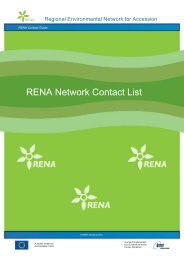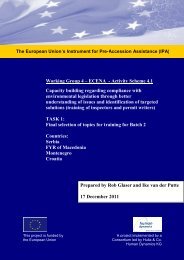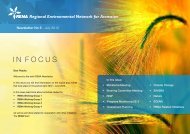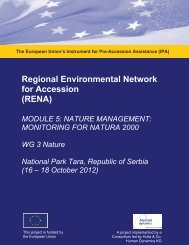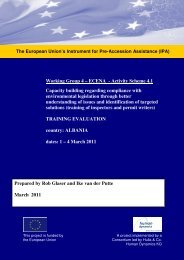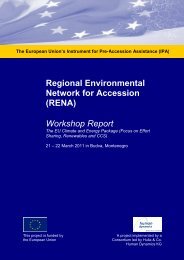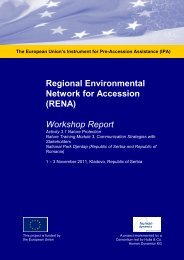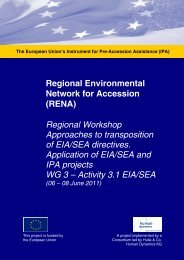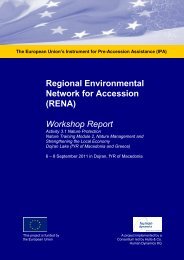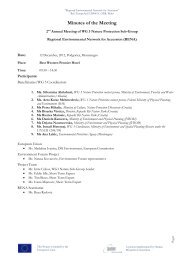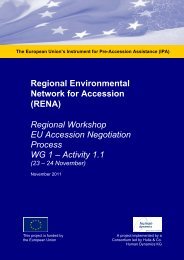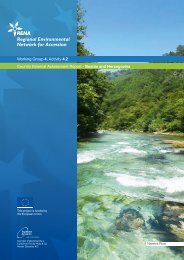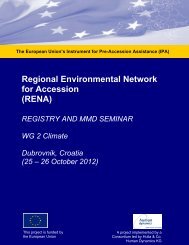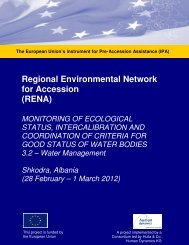3rd Interim report September 2011- March 2012.pdf - Renanetwork.org
3rd Interim report September 2011- March 2012.pdf - Renanetwork.org
3rd Interim report September 2011- March 2012.pdf - Renanetwork.org
You also want an ePaper? Increase the reach of your titles
YUMPU automatically turns print PDFs into web optimized ePapers that Google loves.
“Regional Environmental Network for Accession”<br />
Ref: EuropeAid/128906/C/SER/Multi<br />
6. WFD derogations and public<br />
participation, as well as stakeholder<br />
involvement. Third Annual meeting.<br />
Neretva river<br />
basin<br />
17-19 October 2012, Mostar<br />
(BiH)or Zagreb (Croatia)<br />
Ms. Dragana Milovanović (Serbia) commented that in addition to national presentations it would be<br />
very useful to have regional cross border cooperation activities presented in the future trainings as well.<br />
For example, on <strong>March</strong> 2012 Danube River Basin Management Plan will be completed and during the<br />
next meeting presentation about it could be made.<br />
Mr. Stephan von Keitz supported this idea. RENA countries might have problems which can be<br />
specific and different from the ones in the EU Member States, so presentation of such kind of joint<br />
activities could be very helpful. It would be also very useful and interesting to compare methodologies<br />
applied for the development of RBMPs. It is not correct to think that EU Member States have all the<br />
knowledge and accession countries may just copy the activities already performed. Mr. Von Keitz<br />
stressed that all countries should sit together and collect good ideas. There is no one who knows all the<br />
necessary topics related to the WFD implementation, so RENA meetings are an excellent opportunity<br />
for all participants to work jointly.<br />
Ms. Dunja Barisic (Croatia) noted that all Water Management sub- group workshops were very useful<br />
and the third one was the best. Participants were very active. She also stressed that the knowledge gained<br />
during the workshop was very useful for practical implementation as there were quite many problems<br />
with these issues in her own institution. She expressed her wish to have more emphasis on the WFD<br />
related economic analysis.<br />
Ms. Semėnienė promised to the participants that in the future topics on economic issues will be<br />
presented during morning sessions, as these topics are in most cases new to participants and thus require<br />
good concentration.<br />
She asked participants to express their particular needs and wishes regarding the next 4 th training<br />
workshop.<br />
Ms. Ljupka Dimovska Zajkov (Macedonia) wishes to have presentation on MIKE SHE model in<br />
order to learn and to have some exercises with it. It would be useful to receive information what data is<br />
needed for modelling and to decide which model to use.<br />
Mr. Stephan von Keitz noted that modelling issue is very ambitious, though every country should go<br />
through this process. During training session it would be fair enough to have only ecological assessment<br />
related discussions and to leave chemical assessment out. Chemical status will be touched anyway, as it is<br />
overlapping with ecological status and that would be already quite challenging. At the end of the day we<br />
will know how the system basically works and could be applied, for example for Sava RB. Mr. Stephan<br />
von Keitz expressed his opinion stating that no model could substitute monitoring. Modelling can<br />
forecast how execution of measures would work and affect ecological status. Mr. Stephan von Keitz<br />
expressed his doubt whether it would be efficient to go into details of specific modelling during the<br />
coming training.<br />
Mr. Simonas Valatka asked participants what would be the focus and task for the modelling. The more<br />
sophisticated model you have the more sophisticated data is needed. Usually lack of reliable data is the<br />
main problem. Expert proposed to focus on monitoring issues and how to obtain more reliable data.<br />
Ms. Semėnienė invited participants to send their specific ideas for the next 4 th training within two<br />
weeks so that the programme could be accordingly adjusted. She invited participants also to comment on<br />
the content of 5 th and 6 th training. The latter is planned together with the third Annual Meeting.<br />
Page3<br />
This Project is funded by the<br />
European Union<br />
A project implemented by Human<br />
Dynamics Consortium



